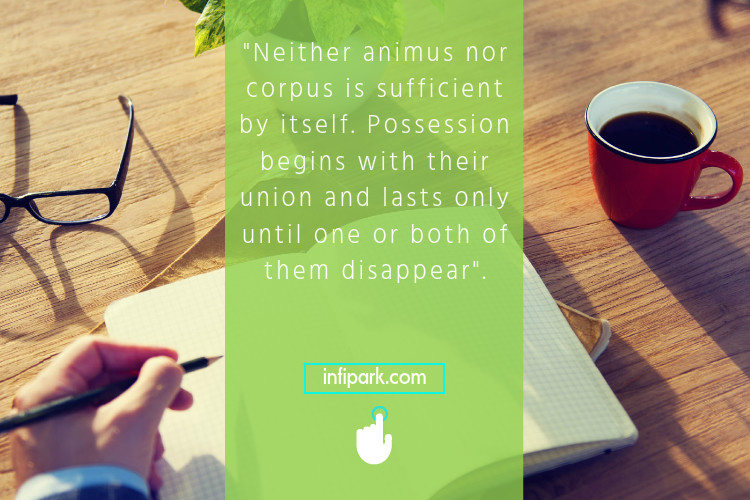“Neither animus nor corpus is sufficient by itself. Possession begins with their union and lasts only until one or both of them disappear”. Discuss. Or Define Possession and explain its essentials.
Ans. Definition of `Possession’– Different jurists have defined pos-session in different ways-
1. According to Salmond, “the possession of a material object is the continuing exercise of a claim to the exclusive use of it.” Thus, possession involves two things :
(i) claim of exclusive user; and
(ii) conscious or actual exercise of this claim i.e., physical control over it. The former is mental element called as animus possessions and the latter is physical element known as the corpus possidendi.
2. According to Zachaiae, “possession is a relation between a per-son and a thing which indicates that the person has an intention to possess that thing and has the capacity of disposing it of.”
3. According to Savigny, “the essence of corporeal possession is to be found in the physical power of exclusion. The first is corpus i.e., physical power to possess a thing for the fust time. The second is having initially acquired the thing, there must be physical power to retain it.”
Salmond, however, does not agree with the Savigny’s view thai possessor must have physical power to exclude alien interference. The true test according to him is not the physical power of exclusion. But the `improbability of interference by other.”
Elements of Possession — According to Savigny possession has two essential elements, namely—
(i) Corpus Possessionis and
(ii) Animus Domini,
(i) Corpus Possessionis—By corpus possessors Savigny means effective control over the thing which in other words means exclusive use of the thing with capacity to eliminate the interference of others.
(ii) Animus Domini—By Animus Domini, Savigny means the in-tention to hold the thing as an owner of it. Both these “elements are considered necessary for legal possession.
Salmond, however, does not think that animus should always be present in legal possession. Lightwood also supports Salmond and holds that power to eliminate external interference need not be an essential ele-ment of possession. Salmond illustrates his view by an example. He says that an infant has no physical capacity to exclude others from depriving him of his possession like a strong and healthy man nevertheless if he holds a coin with him he woiald be deemed to have legal possession of it.
Ihring does not lay much stress on animus possidendi. In his view it is quite immaterial as to how a person intended to possess a thing but what is. important is how he got it. Thus, he lays greater emphasis on the character which determines it’s legality. He considers animus not as an essential element but only as supplemental to a claim of legal possession. Maine pointed out that in early stages of the development of law, physical contact must have been deemed necessary to constitute legal pos-session but in actual practice possession does not mean mere physical control but the intention to possess a thing to the exclusion of others is also equally necessary.
Tholmes has, after analysing the different theories of possession, concluded that both corpus and animus are essential for legal posses-sion. The former is the physical or objective element while the latter is mental or subjective in nature. The terms corpus and animus have been adopted from Roman Law.
Corpus Possessionis—Curpus implies two things, namely—
(i) Possessor’s physical relation to the i e. the object; and
(ii) The relation of possessor to the rest of the world. The first point emphasises that there must exist some physical contact of a person with a thing which he possesses so as to give rise to a reasonable assumption that others will not interfere with it. This assurance of non-interference can be secured in any of the following ways—
(i) Physical Power of the Possessor—The physical power of the possessor over the thing in his possession acts as a guarantee of user of that thing. The person in possession generally uses walls, gates, doors, locks etc. to exclude others from interfering with his legal possession.
(ii) Personal Presence of the Possessor—In many situations mere physical presence of the possessor is enough to retain possession al-though he may not have the necessary physical strength to resist inter-ference. For Example— a coin in a child’s hand is sufficient to denote his possession over the coin though he does not have the physical strength to retain the coin.
(iii) Secrecy — If a person keeps a thing which is in his possession in a hidden place, it is an effective mode of excluding external interference and keeping that thing secured.
(iv) Respect to Rightful Claim—In modern societies, wrongful pos-session is not deemed with favour, therefore, respect for rightful claim prevents others from interfering with the legal possession of the pos-sessor.
(v) Protection Afforded by the Possession of Other Things —At times possession of an object tends to confer possession of certain other things which are connected with it or accessory of it. Thus, possession of land confers possession of things that are on or under it.
(vi) Manifestation of Animus Domini —Another measure of secu-rity of possession is the manifastation of the animus domini. The visibil-ity of the claim is another element in the factual security of its enjoyment.
(ii) The Relation of the Possessor to the Rest of the World —Regarding this point Salmond says : “I am in expectation that I will not be interfered with in the use of it…. .what measure of security is required for possession. We can orily answer : any measure which normally and reasonbly satisfies the ‘animus domini. A thing is possessed, when it stands with respect to other persons in such a position that the pos-sessor, having a reasonable confidence that his claim to it will be re-spected, is content to leave where it is.”
2. Animus Possidendi — The subjective or mental element in pos-session is called animus possidendi which implies intention to appropri-ate to oneself the exclusive use and enjoyment of the thing possessed. The element of animus or desire to possess must have the following features .
(i) The animus or desire to possess need not necessarily be rightful, it may even be consciously wrongful. A thief has a possession of stolen things no less real than the true owner of those things.
(ii) The possessor must have exclusive claim over the thing in his possession. That is, he must intend to exclude others from use and enjoyment of that thing. The exclusion, however, need not be absolute.
(iii) The animus need not amount to a claim or an intention to use the thing as owner. Thus, in case of a pledge, the pledgee, has the possession of the thing pledged although he only intends to retain it in custody, as a security to ensure repayment, of his debt.
(iv) The animus need not be necessarily that of the possessor himself., e.g., a servant, agent, trustee or a bailee do not keep things in possession for their own use but they hold them for some other person.
(v) The animus may not be specific, but it may be merely general For Example— a person who has caught fishes in his net has possession over all of them although he does not know their exact number.
In the legal sense, possession is used as a relative term. The law is generally not concerned with the question as to who has the best title, but it is concerned as to which of the parties before it has a better title. For Example—In Bridges Vs. Hawfcesworth, 1851 it was decided by the court that the bundle of notes found on the floor of a shop passed into the possession of the finder rather than the shopkeeper. The decision has been supported by Pollock and Salmond. Pollock holds that since the shop-keeper (defendant) has no corpus in the bundle of notes, he has no de facto control over it. Salmoad has taken the view that the shop-keeper has no animus for possession.






![Maneka Gandhi v. Union of India [1978] 2 SCR 621: A Watershed Moment in Indian Constitutional Jurisprudence](https://www.infipark.com/articles/wp-content/uploads/2026/02/Image-Feb-18-2026-10_47_59-AM-218x150.jpg)













